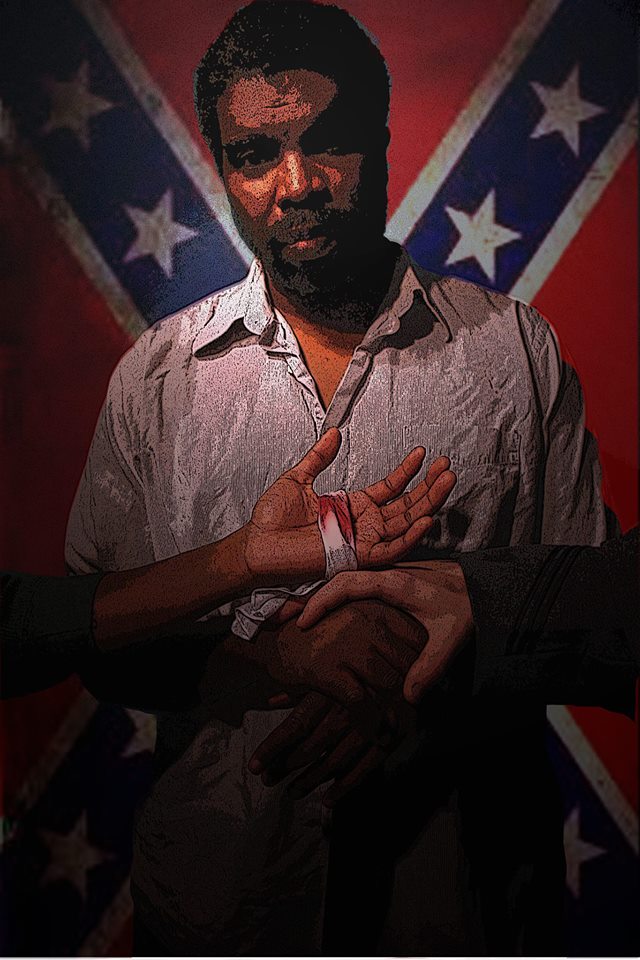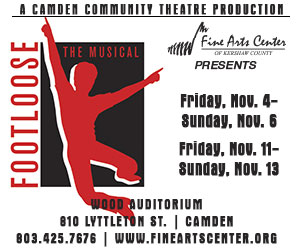By Haley Sprankle
So often, when the topic of slavery arises, many make the rash assumption that all slave owners were bad and that all slaves hated their masters. It is assumed that slavery is solely an issue of racial prejudice. This clouds our understanding of slavery, all of its complexity and paradoxes, and how it ultimately comes down to incredibly personal and fraught relationships.
Fortunately, Matthew Lopez’s The Whipping Man, which the NiA Company is performing once again after a 2013 production, breaks that pattern.
“The Whipping Man is on the surface about a Jewish Confederate officer that returns home at the end of the Civil War to find two of his former slaves waiting among the ruins,” says Charlie Goodrich, who plays Caleb, the aforementioned office. “However, more specifically, I think that it is simply about a family, one that exists beyond biological or socio-economical barriers. The three men that appear on stage fight, poke fun, celebrate, and enjoy each other’s company as members of a family do. No matter the political circumstances, the familial bond still exists between them.”
The play revolves around three characters; Caleb, John (played by Michael Clark), the elder of the two remaining slaves of Caleb’s family, and Simon (played by Darion McCloud), the younger of the two. The three characters celebrate the traditional Jewish holiday of Passover together as they attempt to ascertain the nature of their new relationship.
“The Whipping Man addresses how it was possible for believers of a Faith that reveled in its celebrations of freedom could live with, condone, and put into practice an institution that vehemently juxtaposes itself against what they believed in the first place,” Goodrich explains. “Foremost, the play takes place during Passover in April of 1865. The Jewish Festival of Passover commemorates the Israelites exodus from their enslavement in Egypt. The three characters celebrate Passover with a Seder meal not long after the two former slaves were freed. Throughout the dialogue leading up to this meal, various characters address what it meant to exist in the Jewish Faith as slaveholder and slave, and how this existence proved to be sometimes problematic in their understanding of this faith.”
Aside from the religious aspect, the play also calls into question not only the humanity of the situation the characters face, but the humanity of each character.
“Playing the aforementioned Confederate soldier has created an interesting crossroads between my personal feelings and the history of my family in this state,” confesses Goodrich. “It’s no secret that I’m a pretty liberal individual who has not always felt at home in a state that has historically been primarily conservative. So, it’s no shocker that I went into the production thinking that a Confederate soldier would probably be a total 180 from myself. However, a portion of my Grandmother’s family has been in this state since the 1690’s. Towards the end of the 18th century, a portion of them moved from the Lowcountry to York County. Most of this land, near the town of McConnells, is farm country, and my ancestors owned and ran plantations. Coming across some of their wills in my ancestral research years ago, I discovered that they were slave owners.”
“This discovery got me to thinking: while I am liberal now, how would I have thought 150 years ago? While I, in no way, support slavery or oppression, would I have gone along with my family then or rebelled against them? It’s so easy for me to judge slaveholders now, but how do I know what my ancestors in the same situation were thinking? Did they like owning slaves or was it just Southern tradition that they were observing? To make a long story short, researching my ancestors has opened me up to approaching Caleb without bias. He’s just a man, and like every other man, he has strengths and weaknesses as well as assets and flaws. He makes mistakes and is faced with a lot of the same life decisions that exist to this day. I’ve even been able to find parts of myself within him, and vice versa. Becoming Caleb has proven to be not just a fascinating and rewarding experience, but a relevant one as well.”
Throughout the production, the cast and crew have partnered with Historic Columbia, Columbia Commemorates, One Columbia, and the Unitarian Universalist Congregation of Columbia in tandem with the end of Historic Columbia’s Burning of Columbia celebration that began in February.
“Partnering with all of these institutions has been highly beneficial, most especially in bringing in different audiences to see our show. Columbia Commemorates and Historic Columbia will bring in history buffs; One Columbia will bring in artists; while Unitarian Universalist will bring in an entire congregation of people that are curious to see the play that will be produced in their sanctuary. Unitarian Universalist also used to be a synagogue, and performing the piece there will add to the atmosphere of the play. Furthermore, all of our rehearsals have been at the Unitarian church as well, and the staff and members there could not have been more kind, receptive, and helpful. It has been a pleasure to work with them in such close proximity,” Goodrich says.
So now we ask, what did it mean to be a slave? What did it mean to be a slave owner? What does it mean to be a family?
With some intriguing answers to such questions, The Whipping Man runs April 11-13 at the Unitarian Universalist Congregation of Columbia. Tickets can be purchased through reservations@historiccolumbia.org or at the door.
“I hope the audience will leave with a stronger insight into what it meant to be a slave or a slaveholder at the time of the Civil War,” Goodrich concludes. “Also, I hope audience members leave with a better understanding of what it truly means to be a ‘slave.’ The word is not, for a lack of a better phrase, all ‘black and white.’ There are countless ways that people can be enslaved or enslave themselves, and the playwright does an astute job of bringing up this issue.”







.jpg)